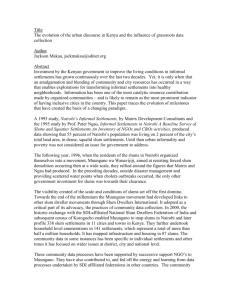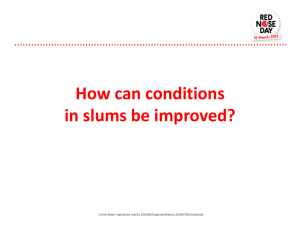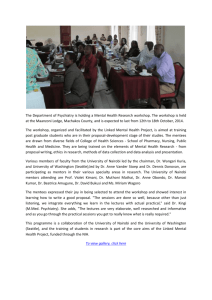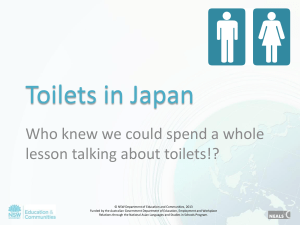OUR RIGHTS OUR LIFE
advertisement
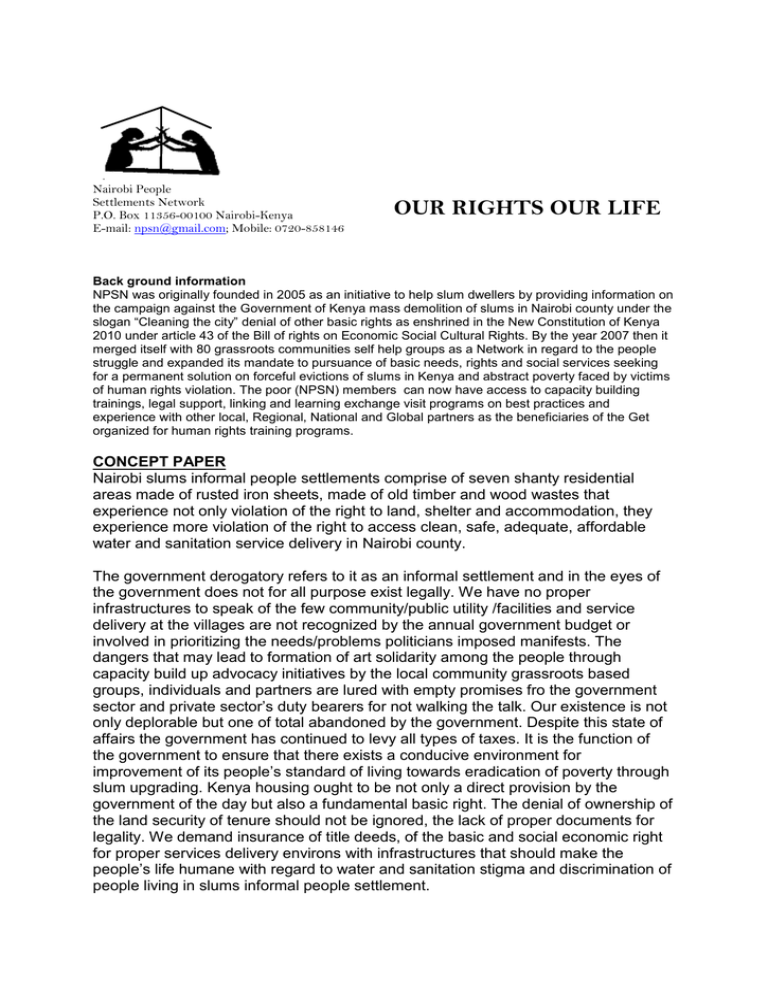
Nairobi People Settlements Network P.O. Box 11356-00100 Nairobi-Kenya E-mail: npsn@gmail.com; Mobile: 0720-858146 OUR RIGHTS OUR LIFE Back ground information NPSN was originally founded in 2005 as an initiative to help slum dwellers by providing information on the campaign against the Government of Kenya mass demolition of slums in Nairobi county under the slogan “Cleaning the city” denial of other basic rights as enshrined in the New Constitution of Kenya 2010 under article 43 of the Bill of rights on Economic Social Cultural Rights. By the year 2007 then it merged itself with 80 grassroots communities self help groups as a Network in regard to the people struggle and expanded its mandate to pursuance of basic needs, rights and social services seeking for a permanent solution on forceful evictions of slums in Kenya and abstract poverty faced by victims of human rights violation. The poor (NPSN) members can now have access to capacity building trainings, legal support, linking and learning exchange visit programs on best practices and experience with other local, Regional, National and Global partners as the beneficiaries of the Get organized for human rights training programs. CONCEPT PAPER Nairobi slums informal people settlements comprise of seven shanty residential areas made of rusted iron sheets, made of old timber and wood wastes that experience not only violation of the right to land, shelter and accommodation, they experience more violation of the right to access clean, safe, adequate, affordable water and sanitation service delivery in Nairobi county. The government derogatory refers to it as an informal settlement and in the eyes of the government does not for all purpose exist legally. We have no proper infrastructures to speak of the few community/public utility /facilities and service delivery at the villages are not recognized by the annual government budget or involved in prioritizing the needs/problems politicians imposed manifests. The dangers that may lead to formation of art solidarity among the people through capacity build up advocacy initiatives by the local community grassroots based groups, individuals and partners are lured with empty promises fro the government sector and private sector’s duty bearers for not walking the talk. Our existence is not only deplorable but one of total abandoned by the government. Despite this state of affairs the government has continued to levy all types of taxes. It is the function of the government to ensure that there exists a conducive environment for improvement of its people’s standard of living towards eradication of poverty through slum upgrading. Kenya housing ought to be not only a direct provision by the government of the day but also a fundamental basic right. The denial of ownership of the land security of tenure should not be ignored, the lack of proper documents for legality. We demand insurance of title deeds, of the basic and social economic right for proper services delivery environs with infrastructures that should make the people’s life humane with regard to water and sanitation stigma and discrimination of people living in slums informal people settlement. Urban proper infrastructure and services delivery are virtually non-existing to the slum informal settlement in areas and residents have no access to social and basic needs i.e. portable water must be purchased from vendors for price up to ten times higher than the rate charged by local authorities, over 5% of the residents do not have access to proper water supply, health, hygiene and sanitary facilities. People are forced to pay to use traditionally dug pit latrines shared by approximately 50 people per toilet or alternatively use other means i.e. flying toilets, bushes, rivers, drainage system etc. The city council cleaners has long stopped collecting refuse, so garbage lies permanently in stinking heaps often blocking the ordinary weak and sewerage drainage system/channels. The lack of sanitary facilities for disposal of human waste and garbage has led to serious environment pollution including higher incidence of disease outbreak, Cholera/typhoid, malaria , TB etc. It is therefore our hope that NPSN community in outreaches open air road shows, peer educators forums and talent shows concert /festivals, will sensitize the entire Nairobi on the dismal statistics that are real and prevalent in the lives of the urban poor. It is our hope that this awareness creation activities will be the beginning of a process through which a truly core of a caring fraternity that will help change society’s attitude /behaviour that will help change society’s attitude/behaviour towards the urban poor which constitute a large portion of our residential areas. We have in Nairobi county over 160 slums’ communities that are home to more than 4million people living under a dollar a day. The kind of ….discrimination that people in slums meet affect them from food to eat ……. The residents of Nairobi informal settlements constitutes 65% of the city’s total population, 40 percent live … and yet they are crowded onto only 1.5% of the total land area in the city. This land does not even belong to them. They therefore live in constant fear that their homes one day may be as it is the case today and leave them homeless and landless with nowhere to go only to become internally displaced people based solidarity awareness creation activities with themes that reinterprete understanding … promoting human dignity using …. The project has developed into diversity with. The city council exhauster lorry stopped emptying toilets local latrine long ago because the slum dwellers could not afford the high price set for every how the local hires the lorry from the city council /municipalities. How we do it The manned labours who empty toilets / local pit latrines do the work of disposing waste in the board day light without protective gears or aware of the health hazard they put themselves and the society at risk of outbreak and environmental pollution. Tools for the local toilet exhausters include 20 litre jericans, handcarts, big water containers/drums, a puller and pushers. The opt to have taken for consideration the good work this group of people offer to the society by supplying them with working tools and materials like gumboots, gloves, mask, aprons and a track with an exhauster since they’ve shown interest and experience of the job that left slums out of the government programs service delivery only because are informal settlements …………any of ………….. On the other hand the communities welcome the good work done by these groups of Kairos local toilets exhausters) slang language used by locals because in every trip they empty a toilet they are paid 400/- and normally in one toilet they can empty up to 8 times by 10 toilets in a day. Some of these only factor these (toilet empters/kairos) that pose a threat to the community include:1. They don’t take health precautions because they throw the toilet waste disposal in dumping sites within the settlements or in a nearby river/drainage system. 2. They are always untidy, dirty with rags as uniform not ready to take bath after their hardwork because in the neighbourhood there is no public sanitary blocks for shower but alcohol is the driving force during their daily activities with or without a tender. 3. They don’t cover the toilet waste disposal its ferried during the day because at night the environs are not secure and this affects many passerby/pedestrians who use the same road to working / market place, garage / school 4. The government don’t pay formal attention to this very hard dangerous and yet import for livelihood supporting where necessary 5. Some cartels have emerge and these job of emptying toilets is now attracting the youth therefore increase of the service delivery is equivalent to the risks posed to the community.
